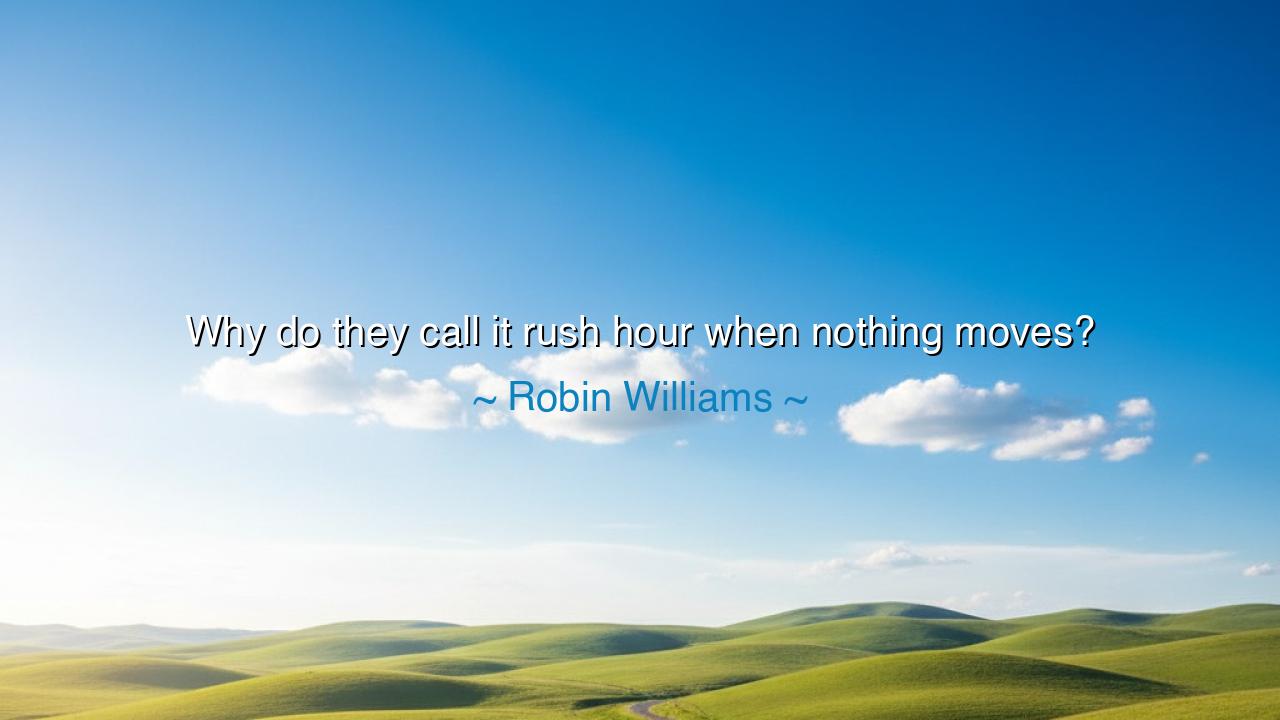
Why do they call it rush hour when nothing moves?






"Why do they call it rush hour when nothing moves?" – Robin Williams
In the modern age, the concept of time has become a strange and often elusive force. We are constantly told to be efficient, to be productive, to be in a hurry, yet there are moments when the very idea of progress seems to stand still. Robin Williams, in his characteristic wit, shines a light on one of the great paradoxes of our time: the rush hour, a period when the very idea of progress—of moving forward—becomes an illusion. This quote speaks to the frustration of modern life, where we are caught in systems that promise efficiency and movement, yet deliver nothing but stagnation and boredom. It is a reflection of the disconnection between the rushed pace of life and the reality of our experience.
In the ancient world, time was often seen in cycles. The sun rose and set, the seasons changed, and life moved at a pace dictated by the natural world. The great philosophers of old, from Heraclitus to Socrates, spoke of time as a river—ever-flowing, ever-moving—but also constantly in flux. Yet, in the modern era, we have tried to bend time to our will, imposing artificial structures like the clock and the calendar onto our lives, forcing us into a race that often leads nowhere. The irony of rush hour is that we are in a hurry, but for what? To be still in a traffic jam? To move towards a destination, only to remain stagnant? Williams’ words remind us that while we may think we are moving toward something, we are often just caught in a cycle of unnecessary activity.
Consider the ancient Greeks, who understood the power of purposeful movement. They did not race through life, but instead celebrated the present moment. The Olympic Games, one of the greatest of Greek traditions, were not about hurrying to the finish line, but about participating in the journey itself. To be part of something greater than oneself, to be in tune with the rhythms of the body and the earth. In stark contrast, the modern rush hour is a race without a finish line—a collective frenzy that leads nowhere but to more frustration. The ancient wisdom of the Greeks teaches us that there is value in movement, but only when it is intentional, not forced.
The industrial revolution, with its advances in technology and transportation, promised to free humanity from the constraints of time and distance. But what did we gain? Instead of freeing us, we became slaves to the clock. We moved from the natural rhythms of the land to the artificial constraints of industry. The modern rush hour is a direct consequence of this—an illusion of progress that leaves us standing still, surrounded by others who are equally caught in the same trap. Just as the great cities of the past—Rome and Babylon—were built to reflect the glory of civilization, so too have our modern cities been designed to reflect the illusion of progress, with their sprawling highways and endless lanes that take us nowhere.
Now, let us turn our gaze to the personal experience of time. In our rush, we often forget to breathe, to notice the world around us. The rush hour is a perfect symbol of how we live today—not simply in a race to get somewhere, but in a race to be someone, to prove our worth through busyness. The ancient stoics, such as Marcus Aurelius and Seneca, would remind us that time is precious—not because it is fleeting, but because it is the only resource we truly have. To waste it in a traffic jam is to waste life itself, to be caught in the illusion of movement without truly going anywhere.
The lesson, then, is one of awareness—of recognizing that true progress does not come from simply moving faster or racing against the clock. True progress comes from intentionality, from understanding that life is not about how much we can cram into a day, but about how we live each moment. In rush hour, we are reminded of the need to slow down, to embrace the present, and to focus on what truly matters. The key to breaking free from the trap of stagnation is to stop chasing the illusion of progress and instead to seek meaningful movement, the kind that aligns with our values, our purpose, and our deeper desires.
So, let us remember Williams’ words as we navigate our own rush hours—not just in traffic, but in life itself. Let us ask ourselves: Are we truly moving, or are we simply spinning in place? The answer lies not in the speed of our journey, but in the direction we choose to take. Progress is not about being in a hurry, but about moving with purpose and clarity, so that when we arrive at our destination, we do so with meaning and fulfillment. The true challenge, then, is not to rush, but to know where we are going and why we are going there.






AAdministratorAdministrator
Welcome, honored guests. Please leave a comment, we will respond soon